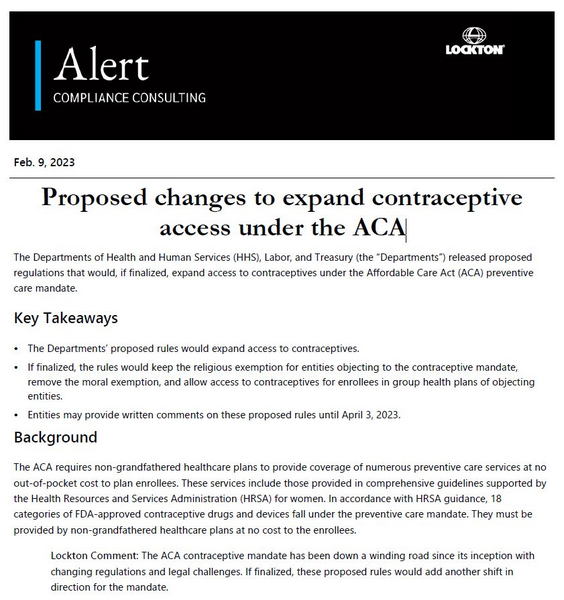The Departments of Health and Human Services (HHS), Labor, and Treasury (the “Departments”) released proposed regulations that would, if finalized, expand access to contraceptives under the Affordable Care Act (ACA) preventive care mandate.
Key Takeaways
The Departments’ proposed rules would expand access to contraceptives.
If finalized, the rules would keep the religious exemption for entities objecting to the contraceptive mandate, remove the moral exemption, and allow access to contraceptives for enrollees in group health plans of objecting entities.
Entities may provide written comments on these proposed rules until April 3, 2023.
Background
The ACA requires non-grandfathered healthcare plans to provide coverage of numerous preventive care services at no out-of-pocket cost to plan enrollees. These services include those provided in comprehensive guidelines supported by the Health Resources and Services Administration (HRSA) for women. In accordance with HRSA guidance, 18 categories of FDA-approved contraceptive drugs and devices fall under the preventive care mandate. They must be provided by non-grandfathered healthcare plans at no cost to the enrollees.
Lockton Comment: The ACA contraceptive mandate has been down a winding road since its inception with changing regulations and legal challenges. If finalized, these proposed rules would add another shift in direction for the mandate.
The proposed rules would expand access to contraceptives in accordance with Biden’s Presidential Executive Order tasking HHS with addressing reproductive health services and supporting women in their ability to access these services. The proposed rules also align with the Administration’s efforts to expand access to reproductive healthcare.
Lockton Comment: The Presidential Executive Order was released in response to the Supreme Court’s Dobbs v. Jackson Women’s Health Organization decision in June 2022 overturning Roe v. Wade and granting states broader abilities to enact laws to restrict, prohibit or allow abortion services within the state.
Current State
Current regulations enacted under the Trump Administration provide exemptions for employers, institutions of higher education arranging student health insurance coverage, issuers, and individuals with religious or moral exemptions from providing coverage for contraceptive services. Objecting entities are not required to provide notice of their objection to the government or plan participants.
Lockton Comment: These current rules expanded the exemption beyond the blanket religious-based exemption for churches (including church auxiliaries, conventions and associations of churches, and religious orders) provided under the Obama administration rules. However, even though the rules provided a broader exemption, research indicates the majority of employers continued to cover contraceptives indicating few employers opted for the exemption.
The current rules allow objecting employers, colleges, and universities the option of providing an accommodation allowing women and dependents enrolled in their plans to access contraception at no cost through an insurer or third-party administrator (TPA), but it is not mandated that the entity do so. If the objecting group opts not to provide such an accommodation, enrollees’ access to contraceptives at no cost is limited.
Proposed Rules and Option for Comment
These proposed rules would remove the moral exemption provided under the current regulations and retain the blanket religious exemption as well as the optional accommodation for those objecting entities’ enrollees.
Lockton Comment: If the rules are finalized, entities currently claiming a non-religious exemption would be required to cover contraceptives in accordance with ACA requirements and without cost-sharing. Additionally, they would need to amend their plan appropriately.
In addition, the proposed rule would provide women and dependents covered by plans an alternate pathway to obtaining contraceptives at no cost where plan sponsors opt out of providing an accommodation. Individuals could seek contraceptive services from any willing provider at no cost to the individual. The provider would then be able to seek reimbursement from an insurer or TPA, who would then be able to offset the cost against certain taxes the insurer or TPA would otherwise remit to federal authorities.
The Departments are taking written comments on these proposed rules until April 3, 2023.
The proposed regulations, as well as the ability to submit a public formal comment, are found here: Federal Register :: Coverage of Certain Preventive Services Under the Affordable Care Act (opens a new window)
 Download alert (opens a new window)
Download alert (opens a new window)

